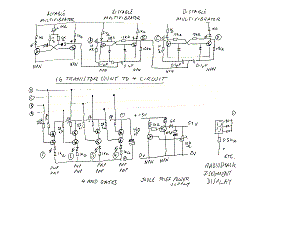| Su | Mo | Tu | We | Th | Fr | Sa |
|---|---|---|---|---|---|---|
| 1 | 2 | |||||
| 3 | 4 | 5 | 6 | 7 | 8 | 9 |
| 10 | 11 | 12 | 13 | 14 | 15 | 16 |
| 17 | 18 | 19 | 20 | 21 | 22 | 23 |
| 24 | 25 | 26 | 27 | 28 | 29 | 30 |
| 31 |
Here is a 16 transistor 1 to 4 counter. It uses one astable multivibrator and two bistable multivibrators and four AND gates to do its counting. I found that it can also drive a red seven segment display I bought from Radio Shack a while back. It uses 5 volts, which it obtains from a 1.5 volt battery using a Joule thief-style voltage booster.
Or - using a regular link...
https://youtu.be/EQgVeVL2NHYThis does not have a practical application, of course! It was interesting to see how to do this using discrete components. Sketching the circuit diagram takes about the same length of time as soldering the components onto the board. I tested each part of the circuit using a breadboard prior to soldering it together.
As this uses one AA battery, and a boost circuit, its one use is doing something decorative, using largely depleted AA batteries. For this application it works well. There is a switch which increases the 'clock' frequency - so this interesting to try occasionally.
There are other nice applications of discrete transistor digital devices around. These have many more transistors!
http://www.megaprocessor.com (> 40,000 transistor computer!)
http://www.transistor-clock.com/ (194 transistor clock)
 |
Although this is a simple circuit built from discrete components, it was nice to make, it shows how digital operations, like dividing by two, and checking whether two inputs are positive, can be carried out to achieve an objective.